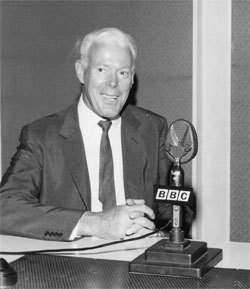This way and that 21 January 1985
Trevor Leggett was head of the Japanese Department of the BBC.

This is one of his broadcasts to Japan
Zubari for 21 January 1985
Hello listeners! Two weeks ago and we had our first big snowfall of the year, and up to a few days ago there was some snow remaining here and there (achi-kochi). Yes: ‘achi-kochi’ – in Japanese the ‘achi’ or ‘achica’ comes first, and then the ‘kochi’ or ‘kochira’. But in English we reverse the order: we say “here and there”. The ‘here’ comes first, and then the ‘there’.
We translators who study Japanese notice such things. For instance, in English we always say “right and left”; in Japanese there is a tendency to say “sayu”, though I admit that one does hear “migi-hidari” sometimes. But the word for to ‘control’ is ‘sayu suru’ where the left comes first.
There are quite a number of such examples, where the order is the reverse. But in our own language, we never question it: it is only when we see the foreign phrase that we get a little surprise.
Many Westerners nowadays know about the two Chinese principles, which the Chinese and Japanese call ‘Inyo’. But I have noticed that when a Westerner talks, or writes, about them, he puts them in the reverse order. He speaks of the “two Chinese principles, which are Yang the positive, and Yin the negative.” He puts them in our English order, which is always ‘positive –negative’. So, he tends to say “Yang-Yin”, unless he is familiar with the original Chinese.
It is very difficult to find out why the order is so different; perhaps it is just chance. In some cases one can find a definite reason. For instance, in English we say “Ladies and Gentlemen” on a formal occasion, at the beginning of a speech. This was a reflection of the idea that women were weaker and so should have protection and also courtesy. But if talking about society in general, a textbook would always say “men and women”.
In listing the points of the compass, the English phrase is: “north-south-east-west”, and it is unexpected to find that the Japanese say “to-zai-nan-boku”. And yet, when I thought about it, I realized that the English order is a bit strange. We are a northern country, and to the north of Britain there is nothing but sea and ice. So, the north is not a very interesting or important direction; we never go north for our holidays, or for business.
I asked Mr. Takamura of the Japanese Section here, why the Japanese phrase begins with the east. To the east of Japan, for a long way, there is nothing but ocean. Until this century, Japan did not do much business with the eastern direction.
He said: “Yes, Tozainanboku. Japan is an agricultural country, and so the sun rising in the east is a major factor. To the west is China, of great importance in our history. Then the south is the direction of warmth, also important to farming people. Only the north, the direction of cold and snow and darkness, is unattractive and unimportant to us. So, naturally, north comes last.
“But to you British people, who are explorers and navigators, who are Vikings, of course the north was most important. Because it is by the Pole Star that for so many centuries you navigated your ships. Of course, the north has been the most important direction for you, so north comes first in your north-south-east-west.
Well, that was an unexpected viewpoint. The Vikings were certainly brave, but they were also terrible pirates and plunderers. Still, they were a very long time ago. We have become respectable since then. We don’t arrive in foreign countries in warships today. We just broadcast on shortwave, and if anyone does not like us, they can switch off. I hope you have not done so.
© Trevor Leggett